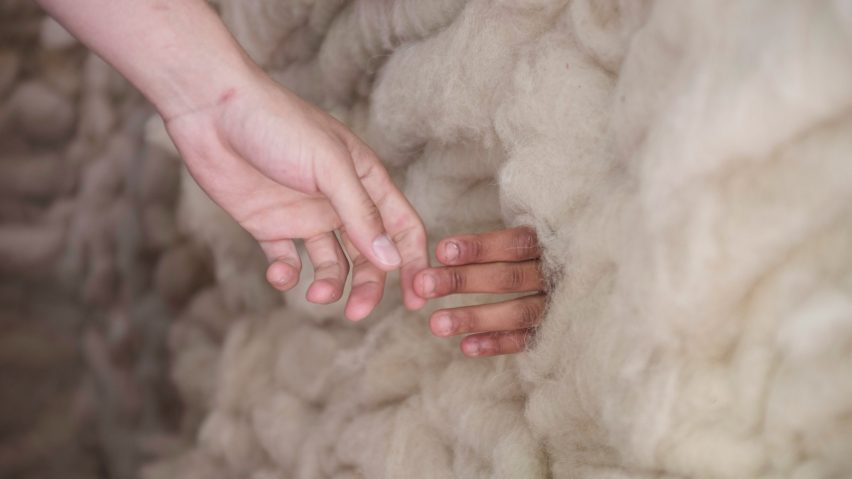Fleecy surfaces create a cosy setting inside this pavilion in western Hungary, which architecture studio AUW hope visitors will use as a space to host "therapy sessions with themselves".
The Wool House pavilion – which features a timber base, tin roof, and fleece-clad facade – was built by Architecture Uncomfortable Workshop (AUW) for architectural festival Hello Wood that takes place every year near Hungary's Lake Balaton.
Having taken an interest in spaces designed for single person use, the Budapest-based architects decided to create a structure where individual festival-goers could temporarily retreat from the noise and crowds.
"We understand this space as a kind of outhouse, where we get rid of our mental excesses," explained the studio in a statement.
Inside the 2.5 square-metre pavilion is a timber stool that directly faces a wool mat on the floor, so that the visitor can choose to sit or lay down.
Intended to suggest the presence of a speaker and listener, the architects hope the structure's layout encourages people to "envision a therapeutic session with themselves".
Thick bundles of wool have been used to stuff the pavilion's wooden frame, insulating it from any surrounding noise. The stepped tin roof was prefabricated and lifted on top of the pavilion by hand. A small opening at its peak allows natural light to filter through to the interiors.
"We've always wanted to work with wool, which is the symbol of warmth for us, and keep the material in its pure presence," said the studio.
Other practices have used somewhat unconventional materials to create tiny temporary structures – Porto-based studio depA used a mirror-like material to clad the entire facade of a pavilion in Serralves park, while architects Thomas Randall-Page and Benedetta Rogers employed bright yellow PVC to form an inflatable pavilion on an east London canal.
Photography is by Simon Platter, Balazs Glodi and Tamas Bujnovszky.
Project credits:
Design: Architecture Uncomfortable Workshop (AUW) + Marton Low
Team members: Riederauer Dóra, Winkler Márk, Alžběta Brůhová, Harriet Dyke, Lenneke Slangen, Tina Peirlinck, Elek Jozsef and Simon Platter

